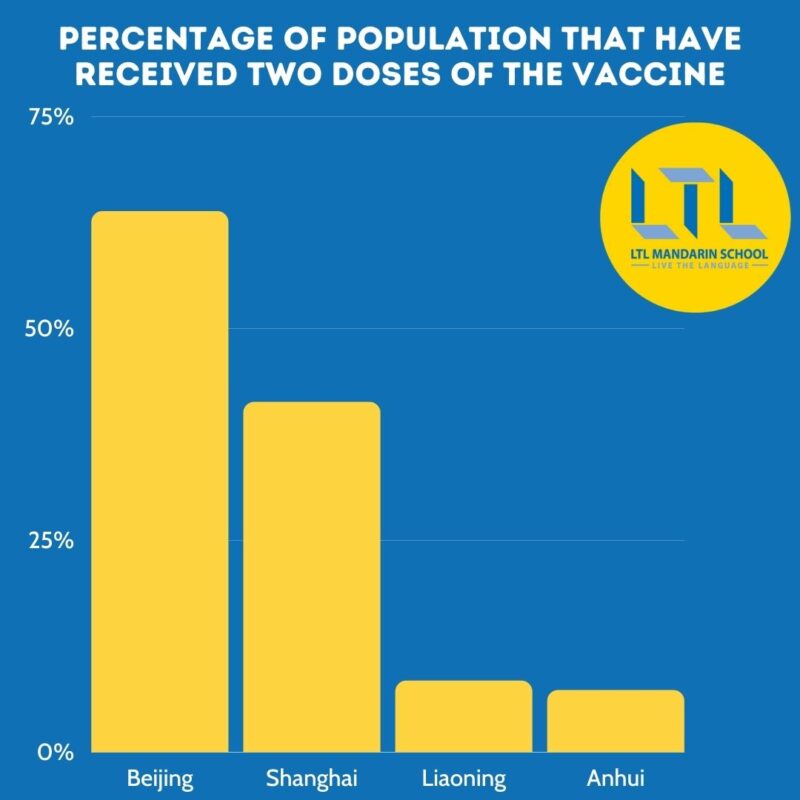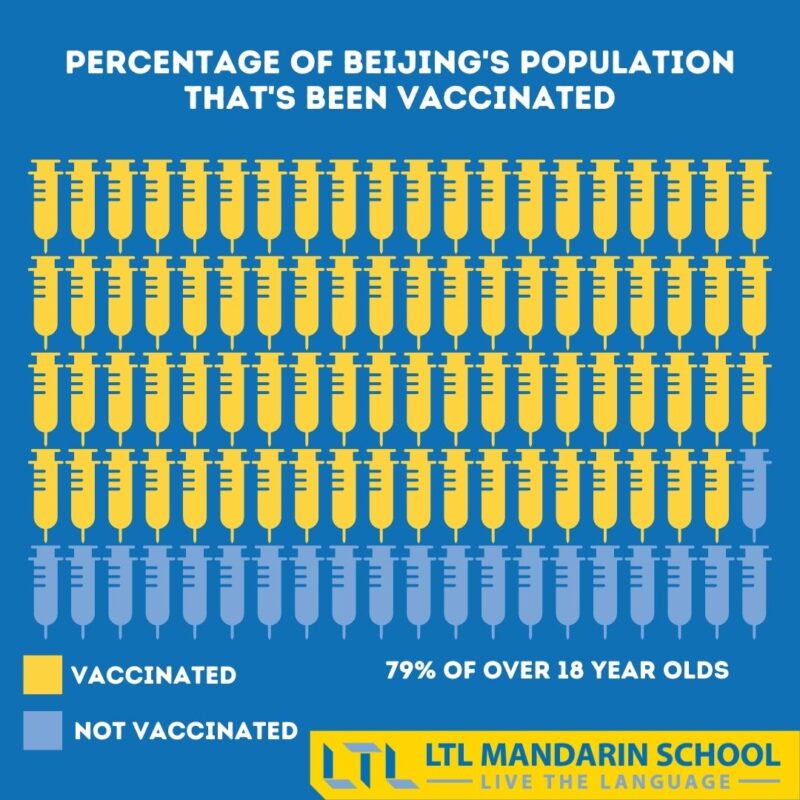Vaccination in China – Key Facts About Getting it as a Foreigner
Vaccination in China 🤔 Plus What Life is Like in China After Covid-19
Getting the Covid-19 vaccination in China is a big decision for any foreigner living there. So we’ve put together an overview of the key facts and the process for foreigners to get the vaccination in China to make it easier for you!
Along with this we’re also going to have a look at what life is like in China now it’s in a “post Covid-19” state.
Vaccination in China – Can Foreigners Get the Vaccine?
Vaccination in China – What Vaccines are Available
Vaccination in China – What’s the Uptake in China Been Like?
Vaccination in China – Vaccine Passports
Vaccination in China – My Story
Vaccination in China – China Post Covid-19

Vaccination in China – Can Foreigners Get the Vaccine?
Yes as of 26th March 2021 in Beijing and 29th March 2021 in Shanghai foreigners are now able to apply to get the vaccine in China.
The process of how to apply for the vaccine varies depending on the city as does the cost of the vaccine for those who don’t pay for medical insurance. Here is a quick overview of the vaccination policy for both cities:
| Beijing | Shanghai | |
|---|---|---|
| Start Date | 26th March | 29th March |
| Principle | Voluntary application, informed consent and at their own risk | Voluntary application, informed consent and at their own risk |
| Cost | Free for those enrolled in the city’s medical insurance system. 93.5 CNY for those who aren’t | Free for those enrolled in the city’s medical insurance system. 100 CNY for those who aren’t |
| How to Apply | Through employer, school or university, residential community or some international hospitals | Through the city’s Health Cloud app |
Other cities, such as Nanjing have also announced that foreigners can apply to get the vaccine there as well.
If you are in a city other than Beijing or Shanghai you should check to see how you book appointments for your city specifically.
Vaccination in China – What Vaccines are Available
Currently in China there are two main vaccines available which are both Chinese produced they are: Sinovac and Sinopharm.
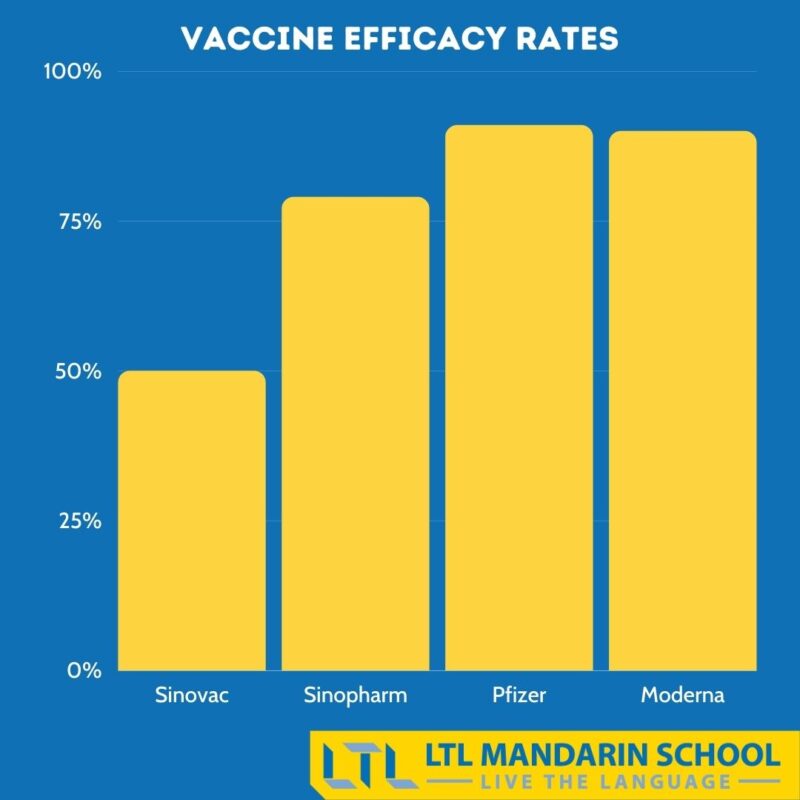
The efficacy rate for Sinovac has been put at just over 50% and for Sinopharm at 79%. This has caused some scepticism about the effectiveness of the Chinese vaccines, as the efficacy rate is significantly lower than other Western vaccines. For instance both Pfizer and Moderna have efficacy rates of over 90%.
There have also been some doubts about how effective the Chinese vaccines will be against some of the new strains that have been emerging such as the Indian variant etc.
Since the beginning of May a third Chinese made vaccine was rolled out in Shanghai and some surrounding cities.
It is called the Convidecia vaccine and only requires one shot, unlike Sinovac and Sinopharm which both require two shots.
Both Sinovac and Sinopharm have now been officially approved by the WHO.
Sinopharm was granted emergency approval at the beginning of May 2021 and Sinovac was granted emergency approval at the beginning of June 2021.
No foreign produced vaccines have yet been approved for use in China, however it’s been rumoured that some companies such as Pfizer are trying to get their vaccine approved for use there. There haven’t been any official announcements on this but some sources report that it may be approved by the end of June 2021, while others say it won’t be approved until the end of the year.
We’ll update this article as and when we find out further news.
What’s the Uptake in China been like?
There were some initial problems with the vaccine roll out as because of the low number of cases of Covid-19 many Chinese people have felt that as Covid-19 doesn’t really pose much of a threat to China there isn’t a need to get the vaccine.
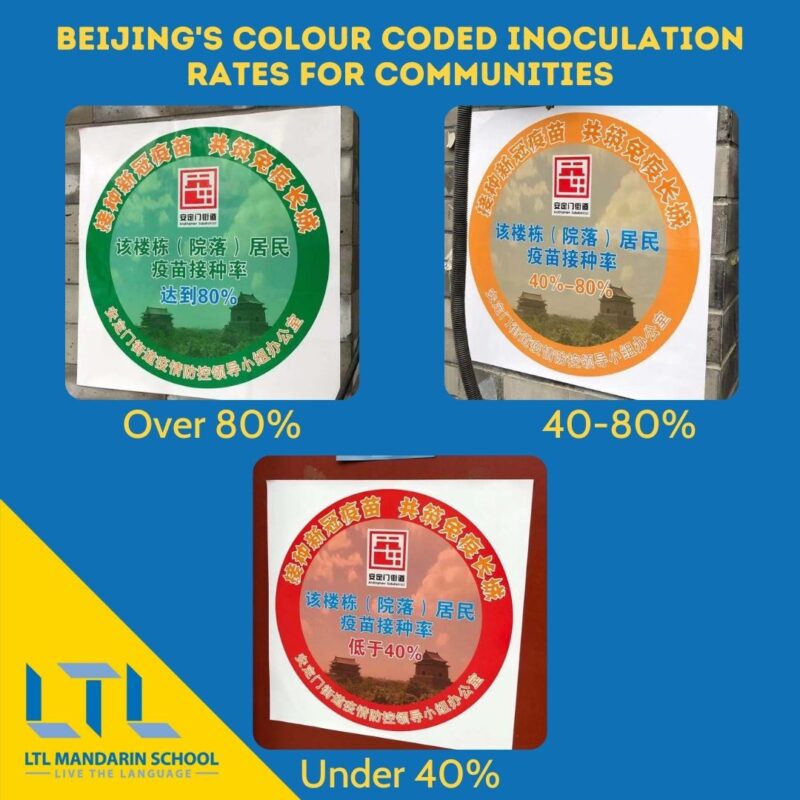
It was reported that there was an especially low turn out with the elderly Chinese.
This has led the government to introduce some, what can perhaps be perceived as unusual methods to persuade the more elderly Chinese population of getting the vaccine.
One such enticement was giving free eggs to recipients when they got the vaccine.
Another technique can basically be summed up as naming and shaming communities.
Around Beijing these signs popped up declaring the percentage of people in that community that had received the vaccine. Green for over 80%, orange or blue for 40-80% and a big glaring red for under 40%.
Well, the government initiatives seem to have worked! In Beijing as of 16th May 2021 over 79% of people aged over 18 have received the first dose of the vaccine and 63.8% have received two doses. This is great news for Beijing, however other provinces are faring less well, with Anhui reporting an inoculation rate of 7.3% and Liaoning 8.4% (two doses).
The vaccination drive in China has continued to be going strong with it being reported that during the first week of June there was an average of 20 million people being vaccinated against Covid-19 everyday.
Vaccination in China – Vaccine Passports
Vaccine passports is a term that has been thrown around a lot since the first Covid-19 vaccines became available.
Many countries have been considering introducing them and China is no exception.
So does China have a vaccine passport program already in place?
Yes, currently China has launched a vaccine passport through a mini program within WeChat, much like the Health Kit which also exists within WeChat.
However, currently only Chinese citizens with a valid Chinese ID card number can register with the program.
In the future, foreigners may also be able to register with the program, but it’s unknown whether other countries will accept the validity of the Chinese vaccine passport. At the moment only Israel have publicly said that they will work with China in the hopes of easing travel restrictions between the two countries.
Ministry spokesman Zhao Lijian has said China hopes that the use of vaccine passports will “help promote world economic recovery and facilitate cross-border travel” and also that “China is ready to discuss with other countries on establishing mutually recognised mechanisms for health codes”.
With the US, UK and Europe also working on their own vaccination passport schemes, it is hoped that in the future there will be some global cooperation that will make it easier for international travel.
China also recently announced that it would accept US coronavirus vaccination records in travel applications, which many have taken as a positive sign that there will be more acceptance of other countries vaccinations in the future.
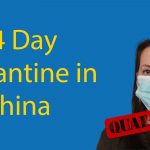
14 Day Quarantine in China 😲 Everything You Need to Know
To help other foreigners who are also in the process of returning to, or coming to China, I’ve put together my experience of the 14 day quarantine in China.
Vaccination in China – My Story
With the hope that getting the vaccine would make travelling easier and that perhaps with a bit of luck I will be able to return to the UK for Christmas I was very eager to get the vaccination once it was made available to foreigners.
Booking An Appointment
At the time when the vaccination became available to foreigners I had three possible options for booking my vaccine appointment.
One option was to book it through the building management at my work, the second was to book it through the community where I live and the third was to book it through an international hospital.
In Beijing all of these options were completely free for me so I decided to go with the option that seemed easiest which was booking through an international hospital.
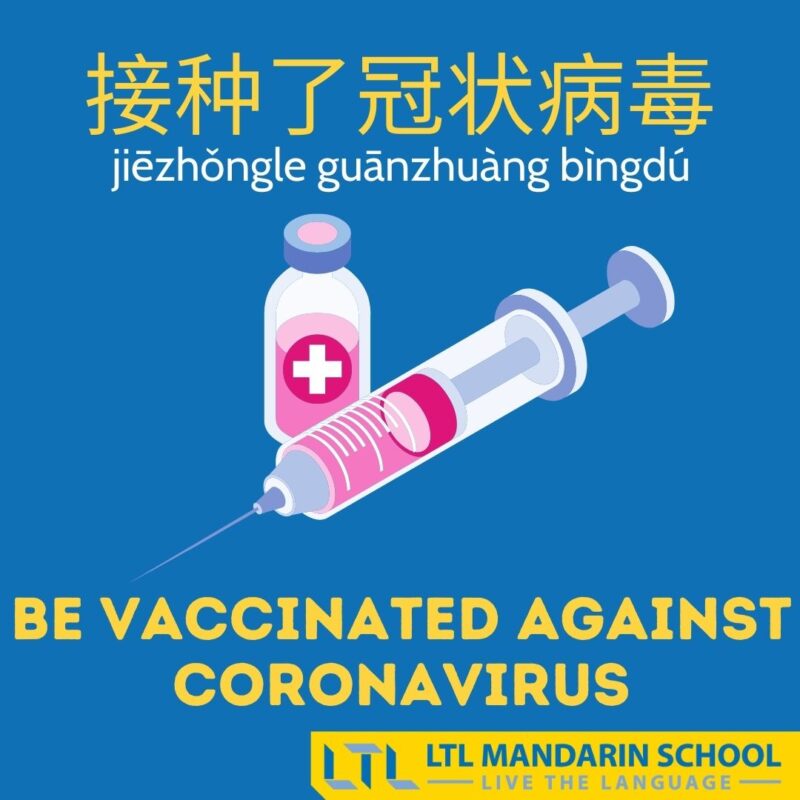
Through The Beijinger I found out that Beijing United Family Hospital was offering the vaccine to any foreigners living or working in Chaoyang District. They shared a QR code that you could scan which then sent you to a sign up form.
Everything was in English and Chinese so it was super straight forward and easy to understand.
Although I do speak Chinese, my knowledge of health specific vocabulary isn’t the best so I felt much more comfortable with having the process explained in English as well.
Once I submitted the form I only had to wait for about 24 hours to receive a text message from the hospital confirming my appointment. It was set for roughly two weeks time from when I registered.
Getting the First Dose
The day before my appointment I received a text from the hospital just to remind me of my appointment and that I would need to bring my passport.
My appointment was 13:30 at their Guanqumen Clinic, which is a short cycle from my work so was very convenient to get to. On arriving at the clinic I was greeted at the door by staff and was asked to scan the health code and then go up to reception.
At reception I was given three different forms to fill in, two of which were the same just one was in English and one Chinese.
Once I completed the forms I was taken in to see a doctor to go over the forms and explain about the vaccine process. The doctor spoke fluent English and also asked me if I had any questions about the vaccine etc.
After the meeting with the doctor it was time to get the jab, which was administered by two nurses in another room. Once I got the jab I was led to an “observation area” where I had to wait for half an hour just to make sure there were no adverse effects from getting the jab.
When I could leave I was told that my appointment for the next vaccine would be in four weeks and that I would receive a text confirming this, which I did receive later that day.
The whole process only took about an hour and everything went extremely smoothly, all the staff spoke English and were very friendly and helpful.
Only a short time after receiving the vaccine, the information had already been linked to my WeChat Health Kit which showed I had been given the first jab.
You can see a video all about my experience going for my first dose below 👇
Getting the Second Dose
Four weeks after getting the first dose of the vaccine I returned to Beijing United Family Hospital for my second jab.
The process was exactly the same as before, I had to fill in three forms before going in, then had a consultation with a doctor, followed by the vaccine being administered by two nurses and then lastly I had to wait for half an hour again in the observation area.
Vaccination in China – China Post Covid-19
So now that China has very few cases of Covid-19 and they are really pushing their vaccination rollout what is life actually like in China in what could be called a “post Covid-19” country?
Overall life in China is in many ways pretty much back to normal, people can go to work, shops, restaurants, bars and clubs are all open as are other entertainment venues such as cinemas and theatres.
However, there are still some key changes to normal life such as the wearing of masks, scanning health code apps etc. which we’ll talk a bit more about.
Masks
It has now become a global norm that wearing a mask is part of your everyday life. Although, even pre Covid-19 it wasn’t uncommon to see people wearing masks in China or in much of East Asia.
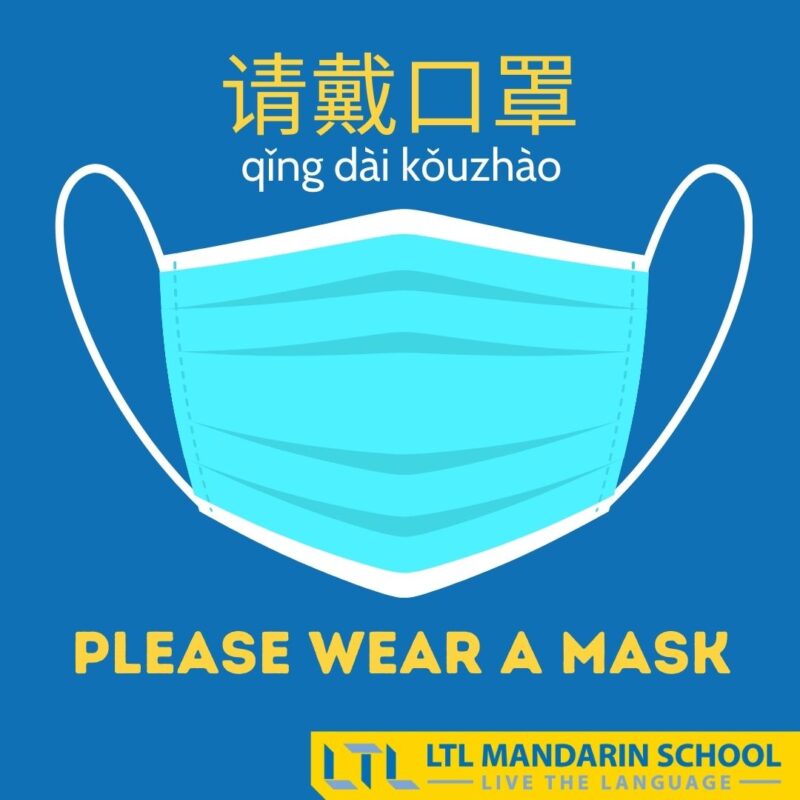
When Covid-19 first appeared in China it quickly became compulsory for masks to be worn at all times including out on the street, on public transport in shops etc.
However, since then there has been some significant easing, such as in August 2020 which saw the removal of the requirement for people to wear masks outside in Beijing.
Despite the requirement to wear a mask being removed many people on the streets in Beijing continue to wear masks, although with the vaccine rollout there has been a slight decline.
In Beijing masks are still compulsory on public transport and some shops still request patrons wear a mask.
Similarly in taxis, wearing a mask is no longer strictly compulsory and is often at the discretion of the driver although Didi will remind passengers that they should wear a mask.
Health Codes
Along with compulsory mask wearing in some places, another key way life in China post Covid-19 has changed is the introduction of “Health Code” apps or mini-programs.
There are a number of different Health Code apps or mini programs being used across China, with many cities using their own specific one.
Rather than go into all of them, we’re just going to look at the main couple of ones which are used in Beijing and Shanghai.
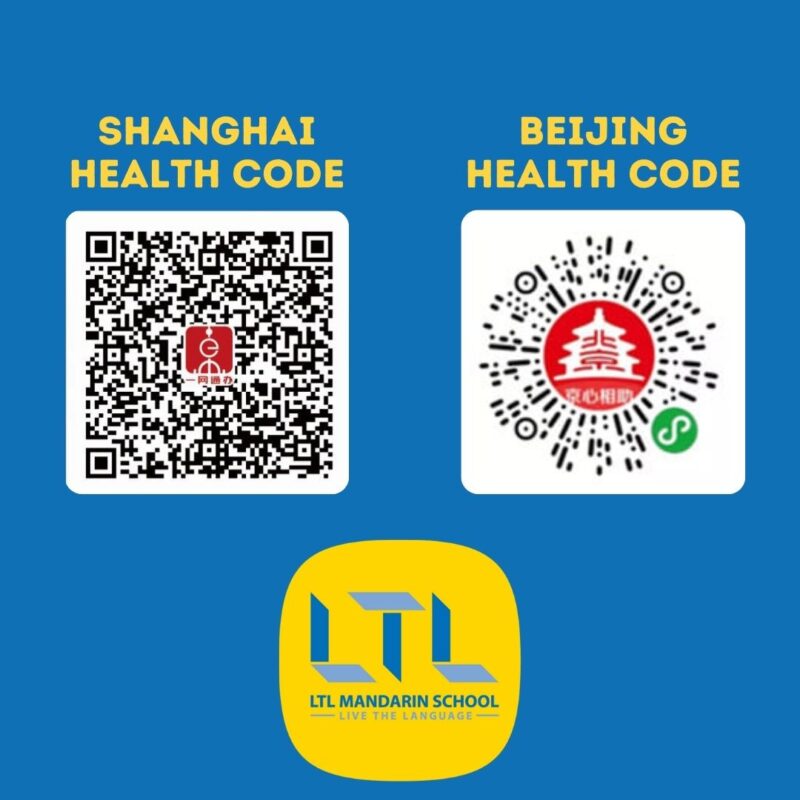
In Beijing a mini-program run through WeChat or AliPay is used which is called the Health Kit or 健康宝 jiànkāng bǎo in Chinese. You fill in your name, passport number, mobile number and a picture of your passport to register with the program.
You’ll then be given a health status of either green, amber or red.
Green means that you have no “abnormal conditions” and can basically go about life as usual.
The Health Kit is used specifically in Beijing, but can also be used in some other cities and when travelling as well.
In Shanghai you can get a Health Code that is only valid in Shanghai through Alipay. You go onto the “City Service” section of Alipay and click on the icon that says 随申码 suí shēn mǎ.
To be able to obtain a Health Code you need to have a verified Alipay account, either where your ID details have been added or it’s been linked to a Chinese bank account.
So how and when are Health Codes actually used?
Normally Health Codes are used when you enter an establishment such as a restaurant, bar, mall etc. If you are unable to access you Health Code many places will allow you to leave your name and phone number instead. Most places will have a QR code you can scan at the entrance and everything is pretty easy and straightforward.
When you’ll be asked to display your Health Code will depend on the city you’re in as well as the number of Covid-19 cases in the specific area you’re in.
For example any spikes in Covid-19 cases or a new case in a city would result in greater monitoring and restrictions so you can expect to need to display your Health Code more.
Domestic Travel
Domestic travel in China is available to all foreigners who have a valid ID (such as passport) and a green Health Code. However, some areas may not accept travellers from what are deemed as “high risk areas” or areas where there has been a recent outbreak.
Most cities are open to visitors and no quarantine should be needed when travelling between cities, however, as mentioned some cities have specific Health Codes so these may be needed.
And of course when travelling by train, plane or bus then masks are mandatory.
Vaccination in China – FAQs
Can foreigners get the vaccine in China?
Yes, as of March 2021 foreigners can get the vaccine in China.
What vaccines are available in China?
Currently there are two main vaccinations available in China the Sinovac vaccine and the Sinopharm vaccine.
Is the vaccine in China free?
Yes the vaccine in China is free for anyone enrolled in the city’s medical insurance system.
Can you travel domestically in China?
Yes, you can travel domestically in China as long as you have a green Health Code.
Want more from LTL?
If you wish to hear more from LTL Mandarin School why not join our mailing list.
Sign up below and become part of our ever growing community.
WANT TO STUDY CHINESE FREE FOR A WEEK? Check out Flexi Classes and get 7 days for free.
We’ve got the best teachers, from the comfort of your own home!
BONUS | Want to learn Chinese in China? Check out our lessons in Beijing.
![[𝗢𝗟𝗗] LTL Beijing Logo](https://old.ltl-beijing.com/wp-content/uploads/logo-ltl-header.png)

 Hi, my name is Sabatino! I am from Italy and I am a Student Advisor at LTL. Fancy coming to study with us in China? Drop me a message.
Hi, my name is Sabatino! I am from Italy and I am a Student Advisor at LTL. Fancy coming to study with us in China? Drop me a message.